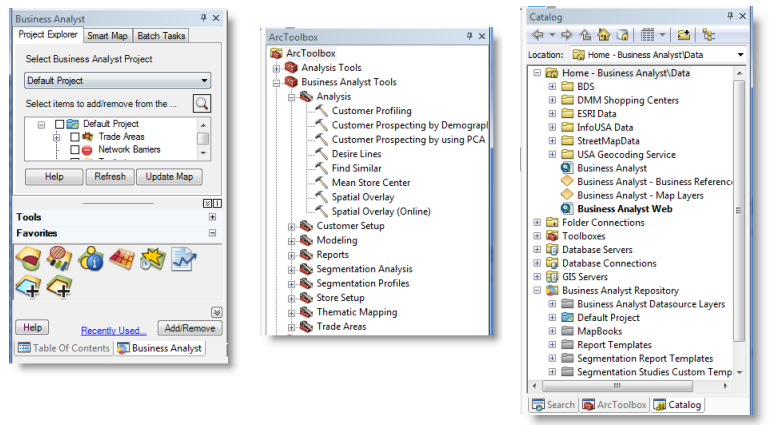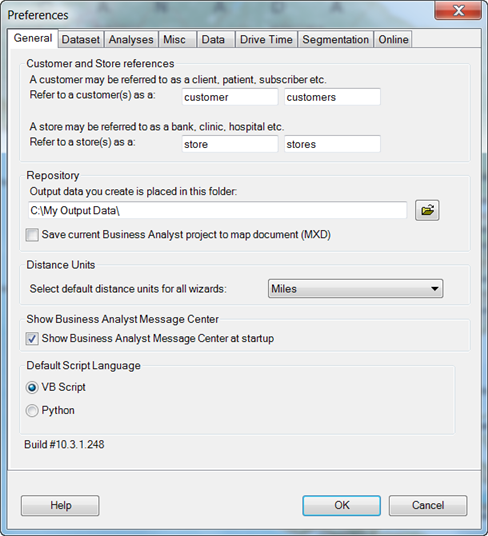Business Analyst is a solution extension to ArcGIS used for a variety of business-critical purposes, including target marketing, analyzing customers, site selection, and designing territories. The wizard-driven software and data bundled with the application is installed and ready to use. Included are annually updated demographic data, nationwide business data points, shopping centers, streets, geocoding locators, drive-time solvers, and a custom report editor.
Toolbars
Business Analyst provides four toolbars:
- Business Analyst—This is the central location where most key Business Analyst functionality resides.
- Color-Coded Maps—This allows quick and easy display for data variables, nationwide.
- Territory Design—This is for designing and managing sales territories and franchise areas.
- Address Coder—This is for batch geocoding your customer point data.

Map Documents
Business Analyst installs two default map documents (.mxd) to get started.
- 2015 Business Analyst.mxd—A traditional vector data-based .mxd allowing customization and cartographic modifications.
- 2015 Business Analyst Web.mxd—Contains a default online map service as a background map for quick panning and zooming.
- You can use any .mxd or a blank .mxd, as long as you add in BDS layers (standard or your custom data) for the Business Analyst wizards to reference.
Windows
There are three primary ArcGIS windows to familiarize yourself with that are important to Business Analyst.
- The Business Analyst window is a centralized location for common tools and toolbars. It also helps manage and retrieve your work.
- The ArcToolbox window allows you to access all the wizard-driven features as geoprocessing tools. The GP tools are great ways to automate your workflows and create models or custom tools.
- The Catalog window contains a special section called the Business Analyst Repository. This folder location contains all your saved work, projects, report templates, and BDS layers.

Custom Data
Business Analyst contains tools for setting up your own custom data so you can run analyses and create reports. The Business Analyst data format is called the Business Analyst datasource, often called BDS Layer or .bds.
BDS Layers are required to run many Business Analyst functions. You can quickly add prestyled map layers (.lyr) from the \Business Analyst\Data\ location.
Tutorial Data
Tutorial data is included to allow you to work with many of the functions in Business Analyst. Navigate to the location where Business Analyst is installed—\Business Analyst\Datasets\Tutorial\—and you'll find three files:
- sales_locations.shp—Used as office locations for Territory Design.
- sf_custs.dbf—A customer location table file for geocoding customers through Customer Setup.
- sf_stores.dbf—A store location table file for geocoding stores through Store Setup. You can link the stores to customers to start further analysis.
Business Analyst Service Packs
The Business Analyst team continuously works on improving and updating the software. Once a version is sent to you, the team works on internal enhancements and change requests. These fixes appear in a service pack. A simple utility is provided to update you on the latest version of Business Analyst or you can update your service pack manually.
Updating Business Analyst using Check for Business Analyst Updates
With internet access, check for updates and service packs to Business Analyst by selecting this item in the Business Analyst program menu using Start > All Programs > ArcGIS > Business Analyst > Check for Business Analyst Updates. The current Business Analyst version is automatically detected. If updates are available, click Download & Install. You can verify the current build number under BA Preferences > General tab.

Updating Business Analyst manually from the Esri Resource Center
If you are unable to run the automatic update utility in Business Analyst due to local security protocols, you can download the service pack from the Esri Resource Center and run the patch locally. Follow the step-by-step instructions on the Business Analyst Service Pack page.